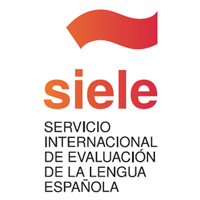Hablamos advises you and prepares you for your university studies
Access to university studies
If, in addition to taking your Spanish courses at Hablamos, you are interested in continuing your studies in Spain with university studies, we advise you to read this essential information about the whole process.
Hablamos collaborates for this purpose with an academy in Madrid with more than 40 years of experience preparing students for university entrance. We tell you all about it below.
How can I study at university in Spain?
If you are a foreign student with a baccalaureate and you want to study a university degree in Spain, the first thing you will need is an accreditation to certify that your baccalaureate studies are valid. This accreditation is given by the UNED (or Universidad Española de Educación a Distancia).
On the other hand, as you will see below, depending on the country where you have done your baccalaureate and previous studies, you may also have to take the Pruebas de Competencias Específicas (PCE). The PCE or Pruebas de Competencias Específicas are the Spanish University Entrance Exams for all those students who have finished their Bachillerato (or equivalent) in a different educational system than the Spanish one.
These tests are a set of exams that will evaluate your knowledge and, if you pass, will allow you to enter a Spanish university, as long as you meet the minimum entry grade.
The entity responsible and the only one in Spain to issue both the Accreditation required by Spanish universities and the PCE exams is the UNED (or Universidad Española de Educación a Distancia) or UNEDassis.
These PCE exams allow access to all public universities in Spain, and many private universities also require them.
The PCE are divided into four modalities: Sciences, Health Sciences, Arts and Humanities, and Social and Legal Sciences. Each modality has several subjects for which the student must sit the exam, and each subject has a specific exam format (exam with multiple-choice questions, questions where you have to develop a topic or solve a practical exercise, etc.).
Students can request that the exam questions be written in English (as well as in Spanish), but it is compulsory to answer the exam in Spanish.
Students can choose a maximum of 6 subjects that will be chosen depending on the modality they have chosen, and the subjects that have the highest weighting or give the most points at the university they want to enter. The official recommendation is to choose a minimum of 4 subjects, and students can request that the exam questions be written in English (as well as in Spanish), but it is compulsory to answer the exam in Spanish.
When it comes to knowing whether you have to take the compulsory university entrance exam or PCE, it is essential to know whether your country of origin is in the following group or not:
A. COUNTRIES OF THE EUROPEAN UNION: Students from the European Union with a baccalaureate do not have to take the PCE exam and can automatically validate their baccalaureate. They only need to obtain this document: Credencial de Calificación de Acceso issued by the UNED.
However, although it is not compulsory for students from the European Union, many European students take the PCE exams exclusively to increase their marks for certain university degrees that are in high demand or for those with a very high entrance qualification. With this exam, these students can increase their entrance qualification by up to 4 points by taking two subjects in the PCE exam.
B. COUNTRIES WITH AN AGREEMENT WITH THE SPANISH STATE: students from one of these countries: Andorra, Austria, Belgium, Bulgaria, China, Colombia, Croatia, Cyprus, Czech Republic, Denmark, Estonia, Finland, France, Germany, Greece, Hungary, Iceland, Ireland, Italy, Latvia, Liechtenstein, Lithuania, Luxembourg, Malta, Netherlands, Norway, Poland, Portugal, Romania, Slovakia, Slovenia, Sweden, Switzerland and the United Kingdom do not have to take the PCE exam and can have their baccalaureate automatically validated.
They only need to obtain this document: Access Qualification Credential issued by the UNED.
However, as in the case of European students, students from these countries with an agreement can also take the PCE exams to increase their marks for certain university courses that are in high demand or have a very high entrance qualification. With this exam, they can increase their entrance qualification by up to 4 points by taking two subjects in the PCE exam.
C. COUNTRIES OUTSIDE THE EUROPEAN UNION OR COUNTRIES THAT DO NOT HAVE AN AGREEMENT WITH THE SPANISH STATE: for countries that are not in group a) or b), they do have to have their baccalaureate degrees officially recognised and they do have to take the PCE exam in order to gain access to public universities in Spain.
These students have to homologate their qualifications in a process that can be done while preparing for the PCE exam. This exam consists, for this group of students, of at least 4 subjects that they will have to prepare for and sit the exam.
Through a UNED collaborating centre, students can manage all the necessary procedures to prepare for this PCE exam and to gain access to university.
Hablamos collaborates for this purpose with a specialised school that has been preparing students for university entrance for more than 40 years and shares with Hablamos the same commitment to offer quality teaching, a very personalised treatment to the student, and a very professional staff to ensure that students pass the PCE exams.
If you are a student of Hablamos, we will organise a visit to this school for you, and if you are not a student, we will also help you to get in contact with them on our behalf, so that they can advise you and tell you the steps to follow so that you can start the process of preparing for the PCE exam and access to the Spanish university.
This school offers preparation courses from 4 hours a week to very intensive courses of 20 hours a week. The courses have the following characteristics:
- Personalised study programme.
- Daily classes with a maximum of 10 students per class.
- Weekly tutorials with group explanations of all subjects.
- Mock exams every month.
- Virtual Campus 24/7.
In order to take these PCE exams, students should have a B1 level or as close as possible to B1 in Spanish. Subsequently, at the universities in Madrid, students will be required to have a B2 level of Spanish.
The UNED accredits a qualification (maximum 10 points) with which they can participate in admission procedures to Spanish universities:
- For students from the European Union or education systems with reciprocity agreement, this calculation is made with the results obtained in the academic records in the education system of origin.
- For the rest of international students, this qualification is made with the weighting of 60% percent of the grades obtained by the student in their academic record in their country of origin, and 40% is obtained with the PCE tests done at the UNED.
Many universities can give up to 4 additional points, according to their admission criteria, if the student prepares certain subjects and obtains certain results in them. As you can see, passing the PCE exams is key in this whole process, but also preparing certain subjects that will help us to raise our overall mark for university entrance.
The San Bernardo University Centre with which we collaborate has a Student Guidance Service that helps all its students to choose the best subjects and itinerary to successfully pass the PCE exams with a good mark. They will also inform you of all the administrative process involved in this process.
There are two rounds of the ECP each year. The first is held at the end of May or beginning of June, and the second in September.
It is best to sit the first sitting, because if you sit the September sitting, many places in certain courses or universities will already have been taken by students who sat the PCE exam in late May or early June.
Normally, the results of these tests take three to four weeks.
It is important to be aware of the deadlines for registering for the PCE exams, as they have specific dates. After this deadline, you will no longer be able to register and you will not be able to take the exam.
The PCE exams are held in Madrid and in many other cities in Spain, but it is also possible to take the exams in the examination centres affiliated to the UNED in various countries on different continents.
If you need more information on this topic, you can write to us at If you need more information on this topic, you can write to us at clientes@escuela-hablamos.com





